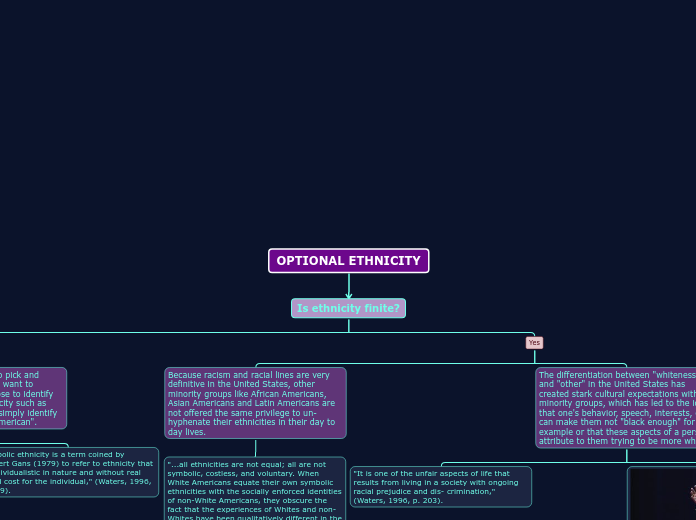Research Questions: If White Americans valued their ancestral ethnicities would that change how non-White Americans felt about their own ancestral ethnicities? Would American race issues be different if White Americans focused more on their individual cultures rather than trying to create an idealistic American culture based on overall "whiteness"?
OPTIONAL ETHNICITY
Is ethnicity finite?
Yes
The differentiation between "whiteness" and "other" in the United States has created stark cultural expectations within minority groups, which has led to the idea that one's behavior, speech, interests, etc. can make them not "black enough" for example or that these aspects of a person attribute to them trying to be more white.
Subtopic
Conclusion: Because ethnicity is largely a social construct this means that the existence of ethnicity is based on one's perception of what ethnicity is. With that being said, the social construction of ethnicity in America is one that is shifting. Non-white americans do not have access to symbolic ethnicities like their white counterparts do. With non-white American's beginning to emerge as the majority American demographic, their perception of ethnicity is going to be the primary one in the United States. Thus, ethnicity is finite and defined by social expectations.
"...the concept that all ethnici- ties mean the same thing, that enjoying the traditions of one's heritage is an option available to a group or an individual, but that such a heritage should not have any social costs associated with it," (Waters, 1996, p. 206).
"In 2019, a little under 40% of the total U.S. population was either nonwhite or Hispanic. Non-Hispanic whites are expected to be a minority of the U.S. population in about 25 years,"(The Associated Press, 2020, p. 2).
"It is one of the unfair aspects of life that results from living in a society with ongoing racial prejudice and dis- crimination," (Waters, 1996, p. 203).
Because racism and racial lines are very definitive in the United States, other minority groups like African Americans, Asian Americans and Latin Americans are not offered the same privilege to un-hyphenate their ethnicities in their day to day lives.
"...all ethnicities are not equal; all are not symbolic, costless, and voluntary. When White Americans equate their own symbolic ethnicities with the socially enforced identities of non-White Americans, they obscure the fact that the experiences of Whites and non-Whites have been qualitatively different in the United States and that the current identities of individuals partly reflect that unequal history," (Waters, 1996, p. 201-202).
No
White Americans are able to pick and choose which ethnicity they want to identify with: they can choose to identify with a more ancestral ethnicity such as Irish American or they can simply identify as the undisputed "White American".
Symbolic ethnicity is a term coined by Herbert Gans (1979) to refer to ethnicity that is individualistic in nature and without real social cost for the individual," (Waters, 1996, p. 199).
"The reality is that White ethnics have a lot more choice and room for maneuver than they themselves think they do. The situation is very different for members of racial minorities, whose lives are strongly influenced by their race or national origin regardless of how much
they may choose not to identify themselves in terms of their ancestries," (Waters, 1996, p.200).









